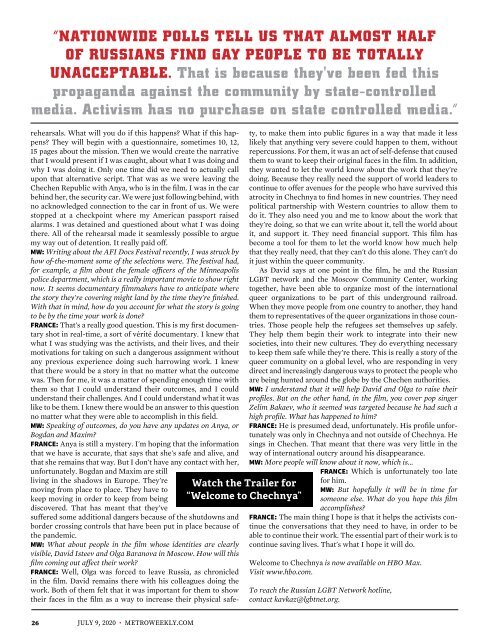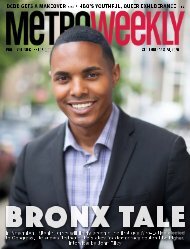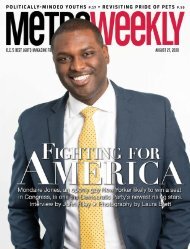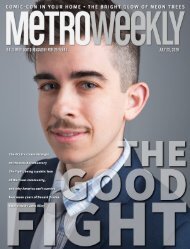Welcome to Chechnya - Metro Weekly - July 9 2020
The Great Escape: David France shares inside details about Welcome to Chechnya, his powerful new documentary about LGBTQ refugees running for their lives. Interview by André Hereford
The Great Escape: David France shares inside details about Welcome to Chechnya, his powerful new documentary about LGBTQ refugees running for their lives. Interview by André Hereford
You also want an ePaper? Increase the reach of your titles
YUMPU automatically turns print PDFs into web optimized ePapers that Google loves.
“NATIONWIDE POLLS TELL US THAT ALMOST HALF<br />
OF RUSSIANS FIND GAY PEOPLE TO BE TOTALLY<br />
UNACCEPTABLE. That is because they've been fed this<br />
propaganda against the community by state-controlled<br />
media. Activism has no purchase on state controlled media.”<br />
rehearsals. What will you do if this happens? What if this happens?<br />
They will begin with a questionnaire, sometimes 10, 12,<br />
15 pages about the mission. Then we would create the narrative<br />
that I would present if I was caught, about what I was doing and<br />
why I was doing it. Only one time did we need <strong>to</strong> actually call<br />
upon that alternative script. That was as we were leaving the<br />
Chechen Republic with Anya, who is in the film. I was in the car<br />
behind her, the security car. We were just following behind, with<br />
no acknowledged connection <strong>to</strong> the car in front of us. We were<br />
s<strong>to</strong>pped at a checkpoint where my American passport raised<br />
alarms. I was detained and questioned about what I was doing<br />
there. All of the rehearsal made it seamlessly possible <strong>to</strong> argue<br />
my way out of detention. It really paid off.<br />
MW: Writing about the AFI Docs Festival recently, I was struck by<br />
how of-the-moment some of the selections were. The festival had,<br />
for example, a film about the female officers of the Minneapolis<br />
police department, which is a really important movie <strong>to</strong> show right<br />
now. It seems documentary filmmakers have <strong>to</strong> anticipate where<br />
the s<strong>to</strong>ry they're covering might land by the time they're finished.<br />
With that in mind, how do you account for what the s<strong>to</strong>ry is going<br />
<strong>to</strong> be by the time your work is done?<br />
FRANCE: That's a really good question. This is my first documentary<br />
shot in real-time, a sort of vérité documentary. I knew that<br />
what I was studying was the activists, and their lives, and their<br />
motivations for taking on such a dangerous assignment without<br />
any previous experience doing such harrowing work. I knew<br />
that there would be a s<strong>to</strong>ry in that no matter what the outcome<br />
was. Then for me, it was a matter of spending enough time with<br />
them so that I could understand their outcomes, and I could<br />
understand their challenges. And I could understand what it was<br />
like <strong>to</strong> be them. I knew there would be an answer <strong>to</strong> this question<br />
no matter what they were able <strong>to</strong> accomplish in this field.<br />
MW: Speaking of outcomes, do you have any updates on Anya, or<br />
Bogdan and Maxim?<br />
FRANCE: Anya is still a mystery. I'm hoping that the information<br />
that we have is accurate, that says that she's safe and alive, and<br />
that she remains that way. But I don't have any contact with her,<br />
unfortunately. Bogdan and Maxim are still<br />
Watch the Trailer for<br />
“<strong>Welcome</strong> <strong>to</strong> <strong>Chechnya</strong>”<br />
living in the shadows in Europe. They're<br />
moving from place <strong>to</strong> place. They have <strong>to</strong><br />
keep moving in order <strong>to</strong> keep from being<br />
discovered. That has meant that they've<br />
suffered some additional dangers because of the shutdowns and<br />
border crossing controls that have been put in place because of<br />
the pandemic.<br />
MW: What about people in the film whose identities are clearly<br />
visible, David Isteev and Olga Baranova in Moscow. How will this<br />
film coming out affect their work?<br />
FRANCE: Well, Olga was forced <strong>to</strong> leave Russia, as chronicled<br />
in the film. David remains there with his colleagues doing the<br />
work. Both of them felt that it was important for them <strong>to</strong> show<br />
their faces in the film as a way <strong>to</strong> increase their physical safety,<br />
<strong>to</strong> make them in<strong>to</strong> public figures in a way that made it less<br />
likely that anything very severe could happen <strong>to</strong> them, without<br />
repercussions. For them, it was an act of self-defense that caused<br />
them <strong>to</strong> want <strong>to</strong> keep their original faces in the film. In addition,<br />
they wanted <strong>to</strong> let the world know about the work that they're<br />
doing. Because they really need the support of world leaders <strong>to</strong><br />
continue <strong>to</strong> offer avenues for the people who have survived this<br />
atrocity in <strong>Chechnya</strong> <strong>to</strong> find homes in new countries. They need<br />
political partnership with Western countries <strong>to</strong> allow them <strong>to</strong><br />
do it. They also need you and me <strong>to</strong> know about the work that<br />
they're doing, so that we can write about it, tell the world about<br />
it, and support it. They need financial support. This film has<br />
become a <strong>to</strong>ol for them <strong>to</strong> let the world know how much help<br />
that they really need, that they can't do this alone. They can't do<br />
it just within the queer community.<br />
As David says at one point in the film, he and the Russian<br />
LGBT network and the Moscow Community Center, working<br />
<strong>to</strong>gether, have been able <strong>to</strong> organize most of the international<br />
queer organizations <strong>to</strong> be part of this underground railroad.<br />
When they move people from one country <strong>to</strong> another, they hand<br />
them <strong>to</strong> representatives of the queer organizations in those countries.<br />
Those people help the refugees set themselves up safely.<br />
They help them begin their work <strong>to</strong> integrate in<strong>to</strong> their new<br />
societies, in<strong>to</strong> their new cultures. They do everything necessary<br />
<strong>to</strong> keep them safe while they're there. This is really a s<strong>to</strong>ry of the<br />
queer community on a global level, who are responding in very<br />
direct and increasingly dangerous ways <strong>to</strong> protect the people who<br />
are being hunted around the globe by the Chechen authorities.<br />
MW: I understand that it will help David and Olga <strong>to</strong> raise their<br />
profiles. But on the other hand, in the film, you cover pop singer<br />
Zelim Bakaev, who it seemed was targeted because he had such a<br />
high profile. What has happened <strong>to</strong> him?<br />
FRANCE: He is presumed dead, unfortunately. His profile unfortunately<br />
was only in <strong>Chechnya</strong> and not outside of <strong>Chechnya</strong>. He<br />
sings in Chechen. That meant that there was very little in the<br />
way of international outcry around his disappearance.<br />
MW: More people will know about it now, which is...<br />
FRANCE: Which is unfortunately <strong>to</strong>o late<br />
for him.<br />
MW: But hopefully it will be in time for<br />
someone else. What do you hope this film<br />
accomplishes?<br />
FRANCE: The main thing I hope is that it helps the activists continue<br />
the conversations that they need <strong>to</strong> have, in order <strong>to</strong> be<br />
able <strong>to</strong> continue their work. The essential part of their work is <strong>to</strong><br />
continue saving lives. That's what I hope it will do.<br />
<strong>Welcome</strong> <strong>to</strong> <strong>Chechnya</strong> is now available on HBO Max.<br />
Visit www.hbo.com.<br />
To reach the Russian LGBT Network hotline,<br />
contact kavkaz@lgbtnet.org.<br />
26<br />
JULY 9, <strong>2020</strong> • METROWEEKLY.COM












